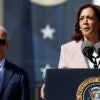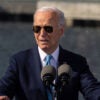The statement Tuesday from the U.S. embassy in Cairo apologizing to Muslims and condemning “the continuing efforts by misguided individuals to hurt the religious feelings of Muslims”—even as an angry, threatening mob was gathering outside the embassy compound—was no aberration.
Though subsequently denounced by both the White House and the State Department, it has to be seen as part and parcel of Obama Administration policy, and it is not surprising at all that it would be the first reaction of the embassy’s communication staff.
As recently as December 19, 2011, the U.S. voted for and was instrumental in passing “U.N. Resolution 16/18” against “religious intolerance,” “condemning the stereotyping, negative profiling and stigmatization of people based on their religion.” While this may sound innocuous, it was the latest incarnation of a highly controversial “anti-blasphemy” resolution that has been pushed by the Organization of Islamic Cooperation (OIC) at the United Nations since 1999.
The real aim of the “anti- blasphemy” resolution is not to protect religion but to clamp down on freedom of expression. Accordingly, “defamation of religion,” by the definition of the 56-member OIC, could include things such as satirizing Mohammed in a newspaper cartoon or a YouTube video, criticism of Sharia law, or security check profiling. A report by the New York–based Human Rights First listed more than 50 cases in 15 countries “where the enforcement of blasphemy laws have resulted in death sentences and long prison terms as well as arbitrary detentions, and have sparked assaults, murders, and mob attacks.”
The U.N. “anti-blasphemy” resolution has been put to the vote by the OIC in the Human Rights Councils every year since 1999 and in the General Assembly every year since 2005. It has passed every year, but it receives a dwindling number of votes. Most Western democracies have voted against, seeing it correctly as a threat to free speech.
Last December, the Obama Administration, during three days of closed negotiations at Foggy Bottom, brokered a compromise for the implementation that allowed the controversial measure to pass the U.N. General Assembly unanimously. The only country to voice concern was Poland, whose representative wondered—rightly—why the only example of interfaith dialogue mentioned in the resolution was located in Saudi Arabia.
The compromise negotiated by Hillary Clinton’s State Department included a nod to freedom of expression. Said U.S. ambassador at large for international religious freedom Suzan Johnson Cook, “We must denounce offensive speech whenever we encounter it—but our commitment to universal principles makes clear that faith must never be a crime and religion must never be used as an excuse to stifle freedom of expression.”
Cook’s message doesn’t seem to have reached the violent mobs attacking U.S. embassies in the Middle East under the pretext of “hurt religious feelings.”






























